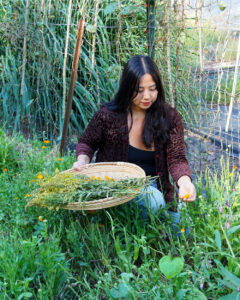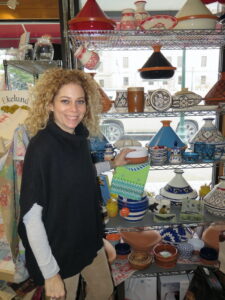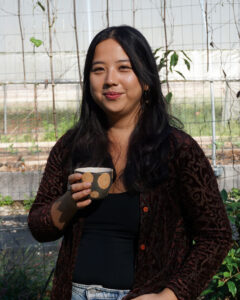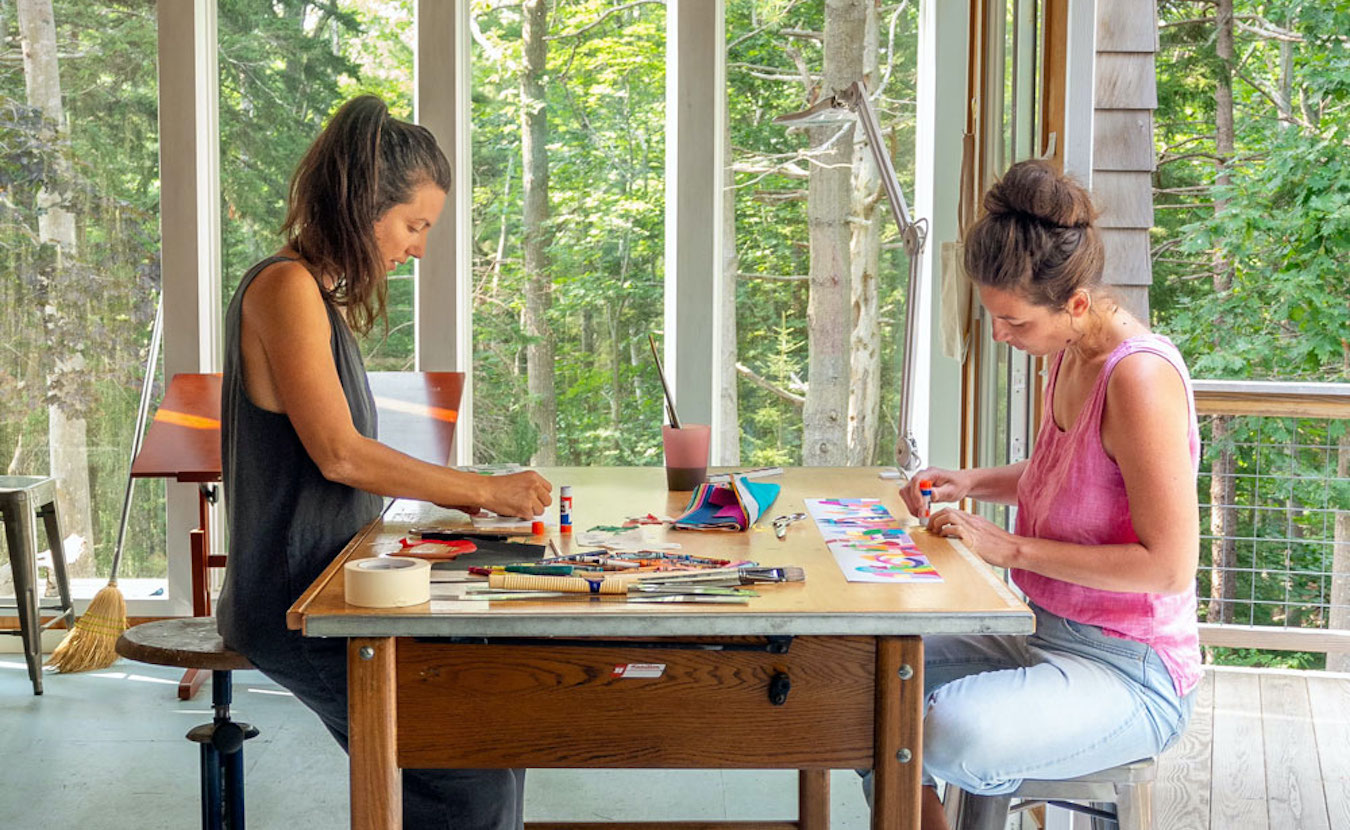What comes to mind when you hear the term “mindfulness”? Perhaps you see an image of someone meditating in lotus pose, maybe journaling, possibly even just breathing, or is it something else altogether? Do you think of the viral Jools Lebron TikTok that instructs women to be “very demure, very mindful” about their appearance at work? How likely are you to think of the business world when you hear the term?
Jon Kabat-Zinn defines mindfulness as “the awareness that arises through paying attention, on purpose, in the present moment, nonjudgmentally.” Kabat-Zinn is a professor, author, and the creator of the mindfulness-based stress reduction (MBSR) program. Though mindfulness originated in ancient Buddhism, Kabat-Zinn teaches a nonreligious iteration of the practice that is accessible to everyone today.

Ash Teng, owner of Blossom and the Bee Tea Co., picks calendula blossoms at the farm run by her and her partner in the Hoosier National Forest. | Photo by Anne Kibbler
Through his MBSR program, Kabat-Zinn helps patients treat a litany of illnesses, both physical and mental, through stress management (and, ultimately, reduction), although his stance on mindfulness goes beyond treating medical conditions. On his website, JonKabat-Zinn.com, he says, “Mindfulness is an intrinsically ethical stance. At this moment in time, nothing could be more important to actualize for the health of humanity and the planet as a whole. The seemingly small is hardly insignificant — it is huge.”
Recently, we’ve seen mindfulness and its effects spreading from the religious and medical sects into other areas of daily life. Social media influencers promote mindfulness online, kids learn the practice in class, and businesses adopt mission statements around the idea.
A December 2022 article for Harvard Business Review says, “More than half of American employers offer some form of mindfulness training to their workers.” This frequently looks like healthy coping mechanisms for stressful situations, emotionally intelligent communication skills for meetings and emails, as well as flexibility in workplace structure. The idea is that these trainings will improve the workplace culture on both individual and overall levels.
Locally, we see a number of small businesses practicing mindfulness in obvious and maybe not-so-obvious ways. While some may focus on similar themes as the corporate examples above, many practice mindfulness in every aspect of their work, and this isn’t a new idea to them. Sourcing materials for products locally, creating slowly, and marketing on a budget are a few ways small businesses could be considered “mindful.” These practices take into consideration the well-being of the environment, the consumer, and the business owner alike. There is a growing trend of sustainability in the business world, as evidenced by movements such as the United Nations’ Global Compact. It is a commitment to sustainability that includes over 20,000 participating businesses. But sustainability and other forms of mindfulness are long familiar to local businesses, and it shows in the work they do.

Samantha Eibling, who co-owns the cooking store Goods for Cooks and Bloomington Yoga Collective, says her mindfulness practice as a yoga instructor extends into the way she runs her store. | Limestone Post
For example, Bloomington’s one-stop kitchen shop, Goods for Cooks, focuses on the slowness of doing things by hand and building human connection. Cooking in and of itself can be a practice in mindfulness, and the Goods for Cooks philosophy acknowledges this. Co-owner Samantha Eibling says food “connects us to one another as we sit to share a meal. It reminds us of who we are and where we’ve come from. Food has a visceral impact long after our bellies have digested a meal. We can remember a long-ago first bite, food’s aroma, or the way a good bread or soup nurtured us. Food has the power to comfort us in our time of need, elevate us in celebration, and secure our survival.”
Various owners of Goods for Cooks have been serving Bloomington since 1973, cultivating community around the kitchen table. The mindfulness of the current owners extends into the way they run their business, as well. Eibling says, “We do things a little old school around here … like using a cash register, writing handwritten receipts, hand-counting inventory, calculating profit margins, et cetera.” She says her staff are taught the importance of holding eye contact while conversing with customers, helping them problem solve and find creative solutions. Eibling believes “most people simply want to be seen, heard, and acknowledged,” and she seeks to meet that need in her work.
Outside of the store, Eibling is also a yoga instructor and co-owns Bloomington Yoga Collective. She says that her mindfulness practice outside of Goods for Cooks has noticeable impacts on the way she runs the store. “My yoga practice has helped inform and strengthen my intentions and the way in which I interact with myself and others. It helps me keep myself in check and my behavior in alignment with my intentions and beliefs. It even bleeds into what we carry at the shop, the materials we use, and even our determination to reuse and recycle what we can from the crazy amount of packaging most people would throw away from deliveries.”
“
Mindfulness is an intrinsically ethical stance. At this moment in time, nothing could be more important to actualize for the health of humanity and the planet as a whole. —Jon Kabat-Zinn
”
Eibling hopes her store impacts her community, in that “we can help others connect to each other, learn about each other, and share good food and drink gathered around the table,” she says. “This is a challenging world, but if people committed to this, there may be space to work through differences and understand each other better.”
We see other versions of mindfulness in The Far Woods, a sister-duo-run creative studio. Nina and Sonya Montenegro, the creative minds behind The Far Woods, use their art to slow down and connect.
The Montenegros focus on the natural pace of working with their hands and their ideas, though sometimes the latter come far quicker than the former, they say. “When inspiration hits, it’s hard not to just run with the excitement and push every other project aside to prioritize that new, fresh idea. Sometimes this new energy is a good sign that that idea needs to be seen through, but we’ve finally learned we usually need to pause and commit to finishing projects and planning out a production schedule instead of jumping around following our whims.”

“Mending Life,” by sisters Nina and Sonya Montenegro, explores the mindful practice and benefits of repairing everyday items. | Courtesy photo
On the flip side, when they hit a creative block, the sisters say they continue to create in other ways, particularly with what they call “hand work projects.” These projects include mending, quilting, pottery, wood carving, or anything else that can be carried about. Busy mothers and professionals, the Montenegros’ hand work projects give them the freedom to travel physically and mentally while still creating.
Speaking of mending, The Far Woods has a focus on the art and healing nature of mending. Their book, Mending Life, teaches readers to repair their clothing by hand, giving new life to well-loved pieces. Like cooking, the practice of mending can be an act of mindfulness. The Montenegros say of this, “We hope that when people read [our book], they feel empowered, inspired, and motivated to fix their clothes instead of tossing them and begin to think of (and feel) mending as an act of reverence, a meditative practice, and a lens through which to see how so many other ‘broken’ aspects of our world are repairable.”
When it comes to formal mindfulness, the Montenegros say, “much of the mindfulness we practice comes in the form of creativity. There is a flow state there — when working with the hands, the mind unwinds and quiets. Everything seems to fall away except for the work right in front of you. And making beauty is a devotional practice — it is a direct connection to the divine.”
The hope of the Far Woods is simple: “To create beautiful pieces that hopefully bring solace, inspire reverence, shift perspectives, and make hand work inviting and accessible.”
Another take on the idea of “mindfulness” can be found at Blossom & The Bee Tea Company. Owner Ash Teng views her personal mindfulness through the lens of her relationship with the earth, and she wants her business to be reverent of that relationship.

Ash Teng, owner of Blossom and the Bee Tea Co., enjoys a cup of mint tea on her farm in the Hoosier National Forest. | Photo by Anne Kibbler
Teng says of her farming practice, “Our tea is mindfully grown, which means that from seed-to-cup, our herbal tea has been grown with the earth in mind, every step of the way. That means following earth-centered practices that sequester carbon, maintain wildlife habitat, and use absolutely no chemicals.”
Teng’s sentiment of reverence toward nature is evident even in the name of her company. She says, “I wanted to pay homage to our humble pollinators, and pay tribute to nature’s love story: Blossom & The Bee.”
One might not think a cup of tea is capable of much impact, but Teng hopes her brews are. She aims to cultivate connection between the land and the community, deepening relationships with the plants that grow here and nourishing the community.
In a world of “industrially farmed teas with extractive and chemically intensive practices,” Teng says, Blossom & The Bee “farms holistically, building soil health and maintaining a biodiverse habitat for our ecosystems to thrive.” Teng farms her teas alongside her partner, Salem Willard, on their farm Bread & Roses Gardens. Willard began his farm, which he describes as “a sustainable no-till, no-chemical farm,” in “the heart of the Hoosier National Forest” in 2011. Teng says it’s “a lush food forest full of medicinal herbs, fruits, nuts, and berries and where we grow all our tea herbs today.”
Personally, Teng observes mindful practices every day. Though she traded the sea and waterfalls of her hometown, Brighton, England, for the wooded hills and still lake waters of Bloomington, she brought her tea and her love of nature with her. She says she starts her morning ritual with a cup of tea, which she describes as “a great way to take a moment to inhale deeply, and sip slowly.” She also enjoys “meditating by the waters of Lake Monroe with a cup of hot tea in hand, hiking the secluded woods, and foraging and cultivating plants.”
Teng says, “I think we all need to incorporate mindful practices in our daily lives, whether that is watching the birds, practicing yoga and breathwork, or even starting seeds. Any action can be mindful if done with intention and gratitude.”
It’s clear that mindfulness is an amoebic practice that can morph to meet the needs of the individual. Be it medical treatment, workplace practice, cooking for loved ones, creating things by hand, brewing tea, hiking, or something else altogether, mindfulness can be anywhere.
Read more
“Can Yoga Save the World?” by Samantha Eibling | Limestone Post
“Ultrasound Tech Can Boost Mindfulness,” by Niranjana Rajalakshmi | Futurity


